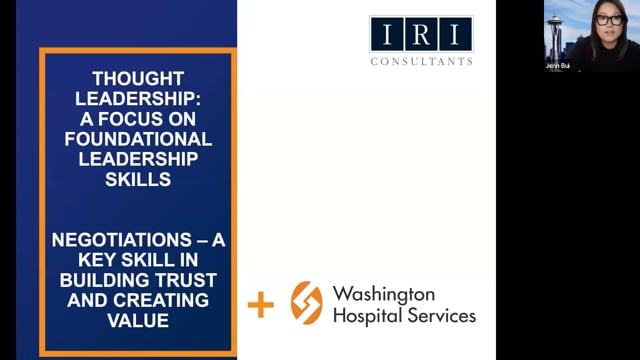Workforce
The Art and Science of Effective Negotiation
Almost everyone’s job requires negotiation, but very few people have received formal training to help them be successful. In healthcare, negotiating a contract with a vendor, a payor, or a union can be challenging. Without practice and specific skills, your organization can suffer.
A proper healthcare negotiations training program should address the activities that must take place before any negotiation, the skills necessary to conduct a successful negotiation, and plenty of chances to practice. The best programs contextualize the training for the healthcare setting.

Washington Hospital Services’ Negotiations Program empowers hospitals and healthcare organizations to effectively negotiate with suppliers, unions, and others.
With experienced negotiators, the program helps hospital staff develop and improve skills that should be employed prior to and during negotiations to secure favorable terms and pricing. Through skill development and role play activities participants will develop the tools they need to prepare for and conduct successful negotiations that deliver concrete results for their organizations.
Register Today
Most experienced professionals have negotiated many times in their lives and have often taken a negotiations course at some point in their career. The current course is intended to sharpen and advance those skills by offering experienced negotiators organizing frameworks and sophisticated strategies to deal with a variety of negotiation scenarios. The course will build participants’ understanding, skill, and confidence to achieve better outcomes in all their negotiations—large and small. Participants will learn how to increase the quality of the agreements they negotiate to maximize potential value, and how to claim as much of that value for themselves, even in complex, ambiguous, or conflict-ridden contexts. A basic premise of the course is that becoming a great negotiator is an ongoing learning journey, where increasing competence is attained through thoughtful, evidence-based skill building.
The course is structured around three types of activities:
• Applying analytical skills to gain a strategic understanding of negotiation contexts
• Learning empirically validated techniques for advancing interests
• Practice, practice, and more practice
Each session will include an in-depth presentation of each topic, breakout sessions and/or activities.
Week 1: Negotiating in organizations
Engaging in value creation across multiple issues with quantitative and qualitative outcomes
Navigating dynamics of power, status, and group identities
Using negotiations to strengthen long-term working relationships
Week 2: Advanced integrative strategies
Identifying counterparts’ values and preferences
Leveraging uncertainty and varied risk preferences for value creation
Engaging in ongoing deal improvement
Week 3: Game theory and coalition building
- Gaining a basic understanding of mixed motive nature of negotiations
- Identifying factors that lead to trust violations and trust building
- Considering the effect of multi-party dynamics on communication
Week 4: Psychological drivers of conflict escalation
- Gaining an awareness of the key psychological drivers of conflict
- Learning to recognize and mitigate cognitive biases that prevent conflict resolution
- Recognizing when and how to involve third parties
Week 5: Communicating across ideological disagreement
- Leveraging questions to identify needs and values in disagreement
- Learning about and practicing techniques for demonstrating engagement with opposing perspectives
- Using story-telling to build trust and authenticity
This course is structured around negotiation simulations in which participants take on a fictional role with specific desires and constraints and negotiate against counterparts.
Plan to spend about 30 minutes each week on simulation prep (required) and 1 hour on assigned readings (optional), in addition to regular class time.
Weekly sessions are online from 9:00 – 10:30 AM on Tuesdays.
May 13 – June 10, 2025
$2,550 per person.
Group discounts are available for 3+ attendees.
Program fee includes course materials and a certificate of completion.
A digital Certificate of Completion will be awarded to participants upon successful completion of the program. Successful completion of the program will be based on attendance of virtual sessions.
Register Today
Effective Negotiation Info Session
Tuesday, March 4, 11:00 – 11:30 AM
 Julia Minson, PhD
Julia Minson, PhD
Julia Minson is an Associate Professor of Public Policy at the Harvard Kennedy School of Government. Her main line of research addresses the “psychology of disagreement” – How do people engage with opinions, values, and judgments that conflict with their own? Her work examines disagreements around hot-button, identity-relevant topics — conflicts around politics, values, and professional and health decision-making.
Julia teaches courses and workshops on negotiations, decision science, and conflict management. Her work has been published in top academic and business outlets as well as widely covered by popular media including the New York Times, the Wall Street Journal, and the Washington Post.
Prior to coming to the Kennedy School, Julia served as an Adjunct Lecturer at the Wharton School, University of Pennsylvania, where she taught Negotiations at both the MBA and the undergraduate levels. She received her PhD in Social Psychology from Stanford University and her BA in Psychology from Harvard University.
